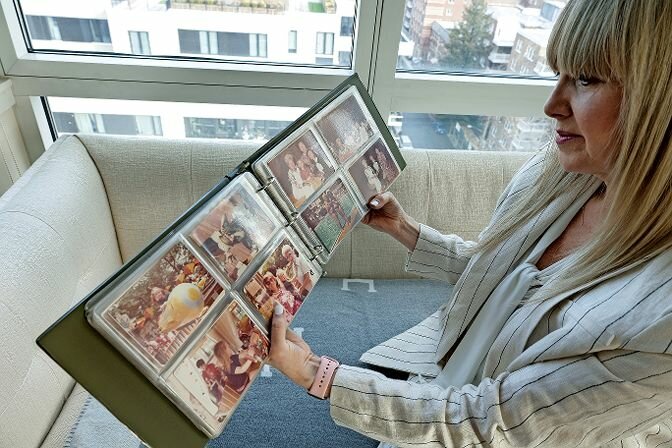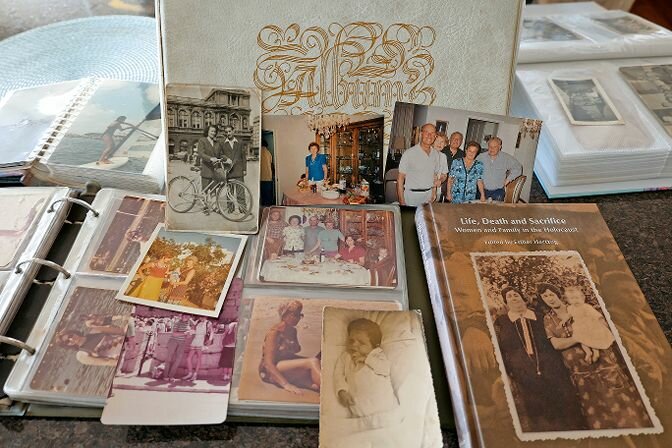A family legacy: Never forget the Holocaust
Local attorney Julie Hyman, her relatives want to preserve stories
Eva Bental, 99, may have died in her Israeli home on Nov. 20, 2023, but her family in both the United States and their homeland don’t want her Holocaust experiences to die with her.
During the tumult of today’s Israel-Hamas war following the Oct. 7 terrorist attack on Israel, Bental, the matriarch of a local Riverdale family endured one final indignity as she lived through yet another war.
It wasn’t so much the war that affected Bental, but the wave of antisemitism that has borne out of it across the globe which brought back memories of her imprisonment in the Auschwitz concentration camp.
“The reason I posted the Facebook page was to share that Eva Bental was the last surviving Holocaust survivor in our family,” said Julie Hyman, a lawyer based in Riverdale. “It was after the Oct. 7 incident and before the first of the hostages were released on Nov. 11, 2023. And I realized it’s an emergency. Every day another Holocaust survivor is dying.”
Eva, who was Hyman’s great-aunt, was taken by the Nazis and wound up in a concentration camp along with other family members. Two of them were Hyman’s grandparents Magda and Schrulek (Sal) Markowicz. Magda, Eva’s sister, was also the mother of Rita Hyman, Julie’s mother.
Bental’s passing leaves only Esther Hertzog, one of Bental’s two daughters (the other was Ilana Lustig), and Hyman alive to tell the family Holocaust stories to the next generations.
“We also had Grandma Magda and Grandpa Sal. Who will tell their stories?” Hyman said. “They will say it never happened. They are already saying Oct. 7 never happened. Only someone like Esther, who has a PhD and can write the story and can share her mother’s story and her family’s story, has the education to pass it along. And on my side of the family, only the first lawyer was able to record my grandfather’s stories.”
Hertzog wrote a journal article some two decades ago about her family’s Holocaust experiences and edited “Life, Death and Sacrifice: Women and Family in the Holocaust.” In the 2000 article, Hertzog focused on gender and motherhood regarding her mother, Eva’s, Holocaust memories.
“My mother, Eva Ben-Tal (nee Viteles) constantly urged me to write about the Holocaust,” Hertzog wrote. “I assume that as the harsh memories fade away with the passing of time, the pain becomes more bearable.
“The change in her approach — from silencing talk about those memories to yearning for them to be documented — is part of a broader, familiar phenomenon associated with many Holocaust survivors.”
Through her research and study of how mothers fared during the Holocaust and seemed to forgive their Nazi captors, Hertzog discovered a trigger that finally got her Eva to open up about her experiences.
“Mention of her grandmother, with whom she stayed at home for three more weeks, after her parents and her sister were taken from the village, arises in the traumatic context of the two-day journey to Auschwitz in a freight train.
“They put them into ‘… freight trains, in sort of carriages; one on top of the other, thousands in one train … and old Grandma … something ghastly. This, this … Look, it’s not good to talk about it. I’m surprised at myself for talk at all. It’s hard to describe, a woman of 84, like this, without being able to get off, to drink or anything.”
Rita Hyman, Julie’s mother, was quite enamored with the cover photo for the book Esther edited.
“The picture for the book that Esther wrote is amazing,” Rita said. “I told her it’s the only picture I have of the great grandmother. Next to her is my grandmother, which I have never seen a picture of. She was holding a picture of a baby. That was Eva.”
There was even more to the preservation of that particular photo, as Rita recalls: “It’s a very old picture. The police had to come to my mother’s apartment after our super decided that when my mother passed away he got a truck and put everything in his truck.
“When it was done, I called the police. I told them my husband is next door. And they asked my husband what is going on. The police told him to go (to the super’s apartment) and get his stuff. We put it in our apartment.”
The situation came about because the super was given the key to the apartment from an uncle who had power of attorney for Rita’s father so he could empty it and prepare it for sale. The father was later sent to live in a nursing home.
As for telling the Holocaust stories of her grandparents, Julie wrote a book she hopes to publish soon called “Sol and His Bowl of Soup.” She said she went with that title because it reflected what her grandfather looked forward to while he was interned: a great bowl of matzah ball soup.
Many of those stories in the Sal book come from stories told by Julie’s grandparents and recounted by her father, Murray, 82, a retired biology teacher at DeWitt Clinton High School. He recounted how Sal liked to take risks with his life and that might be why he wound up surviving not nine concentration camps.
“Sal liked talking about this story,” Murray said.
“He got away with stuff that if he got caught, he would get hanged. If the Nazis would ask if anyone knew how to do anything, he would raise his hand. For instance, when Hitler was making the Autobahn, Sal was given the task of painting the white stripe on the road. Some guy who lived nearby asked him to give him some of the paint. He said he couldn’t do that because they would kill him.
“So, the guy offered him a sandwich in exchange for some paint. Then the guy told him they would never know because Sal could just water down the paint.”
Then there was the story about Sal using a powerful drill the Nazis gave him to drill holes in train cars.
“When the train came into a station, Sal would venture out to the bottom of the rail car to see if anything was ‘leaking’. He then would go under the train a drill a hole in the car so that he could get whatever grain would come out.”
Julie Hyman, who aspires to be a community lawyer in Riverdale, has made it her life’s mission to get the word out to fellow Jews and the rest of the world to never forget the Holocaust. She thanks her grandparents for showing her the way.
“What I learned from my grandparents is the importance of family, the importance of belonging to a temple community, the importance of being a bed and breakfast for our family in Israel to maintain the relationship with Grandma Magda’s sister, her sister’s daughters, their seven children,” Hyman said.
“And the importance of celebrating Jewish high holidays, Hanukkah, Passover and American holidays, too.”









